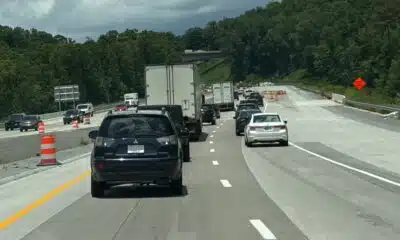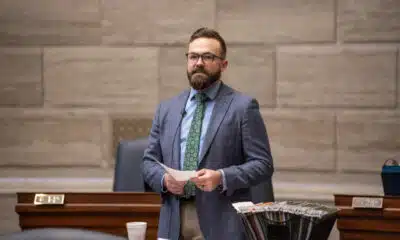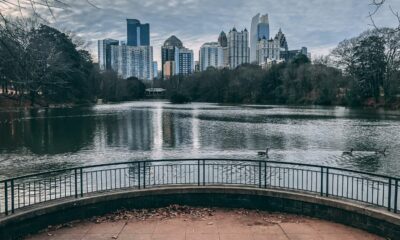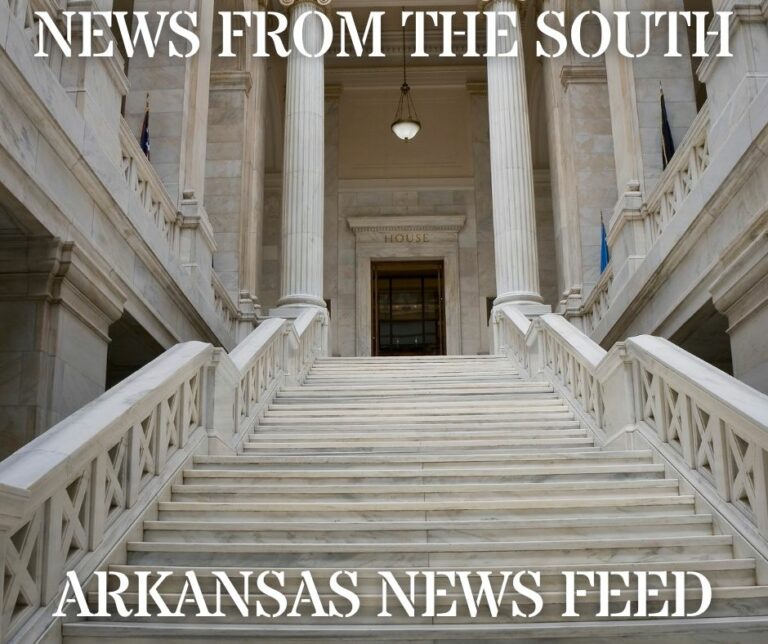News from the South - Kentucky News Feed
WV coal miners ask federal judge for injunction to keep NIOSH functioning to protect from black lung
by Caity Coyne, West Virginia Watch, Kentucky Lantern
May 9, 2025
As the federal government moves forward with a “reorganization” that has left the Coal Workers Health Surveillance Program (CWHSP) largely unstaffed, attorneys for West Virginia coal miners are asking a federal judge to issue a preliminary injunction to keep the program running and grant miners a protection against developing dangerous black lung disease.
In a hearing Wednesday, attorneys for the coal miners argued that the shutdown of the CWHSP — which operates within the National Institute of Occupational Safety and Health — means the government is not meeting its legal obligation to coal miners or others as the work the agency is statutorily required to do is no longer being performed.
Attorneys for the federal government argued that the closure of the CWHSP — as well as other departments within NIOSH — is temporary.
Workers were notified that they were to be on administrative leave on April 1. Last week, some were told to return to work. But this week they were once again moved back to leave and permanent terminations are slated to take place come June.
NIOSH as well as the services performed in it, attorneys for the government said, will eventually return in a reorganized form under the federal Department of Health and Human Services. As such, they contended that the lawsuit on behalf of coal miners was premature.
Those testifying during Wednesday’s hearing in front of U.S. District Judge Irene Berger included coal miners, epidemiologists from the CWHSP and supervisors from within NIOSH.
Coal miners could pay for savings if inspectors lose offices on DOGE list, advocates warn
No one, including the attorneys representing the federal government, provided details or a timeline for when the agency would resume the duties it is required by law to perform.
Laura Reynolds, a supervisor over the CWHSP, was asked if she was aware of any plans or discussions happening to transfer the agency’s services to DHHS.
Her response was one word: “No.”
Scott Laney, who worked as an epidemiologist at NIOSH, said the community of researchers and providers qualified to do the work done by those at the CWHSP is quite small. He hasn’t heard of anyone being asked to do it and has not been included in any plans to train others.
“There is nobody who does the surveillance and breadth of what we do at NIOSH [for black lung],” Laney said.
Without plan to resume services, coal miners left exposed to dangerous dust
Meanwhile, coal miners who have been diagnosed with black lung — including Harry Wiley, a coal miner in Raleigh County who is the lead plaintiff on the class action suit — are in a dangerous position.
NIOSH plays a critical role in the Part 90 program, which allows workers diagnosed with black lung to transfer to a less dusty part of a mine without facing retribution or negative repercussions from a mine operator. Miners transferred under the rule have their pay, benefits and hours protected while being able to work in an area that is less likely to advance their black lung disease.
In order to qualify for Part 90, miners anywhere must have their black lung testing results evaluated and marked eligible by a NIOSH worker in order to be approved.
But now there are no NIOSH workers. Laney said labs certified to test miners for black lung were instructed to stop in April since there was no one at the CWHSP to evaluate the results.
This leaves Wiley, who was diagnosed with black lung in November and who applied for a transfer under Part 90, without any options to protect himself from the dangerous disease advancing.
Trump calls for more coal as his administration delays new black lung protection for miners
And the disease will advance, said Noemi Hall, another NIOSH epidemiologist.
The best protection to stop the progression of black lung — which has no cure and few treatment options — is prevention and reducing any exposure to coal mine dust, Laney said.
“We know that this intervention [of transferring workers to less dusty areas] works from the science,” Laney said. “[It’s] very clear in the scientific research.”
Debbie Johnson, the black lung program director at Bluestone Health in Princeton, told the court she knows of at least four coal miners from her clinic who are depending on the CWHSP to resume services.
Two have already entered their applications for a Part 90 transfer and two others need their results evaluated and certified.
None have heard from NIOSH.
Anita Wolfe, who retired from NIOSH in 2020 but still worked for the agency on a contract basis, said the CWHSP could see more than 5,000 x-rays a year that need to be evaluated. That’s 5,000 workers who could be at risk of developing a complicated and severe form of black lung disease without intervention.
Freeze on CWHSP occurs while silica dust rule under threat
While the federal government says its sorting out what a “reorganization” of NIOSH and the CWHSP will look like, it has also delayed the implementation of a federal labor rule that would have limited miners’ exposure to dangerous silica dust for the first time ever.
That rule was meant to go into effect in April. It’s been delayed until August, however, partially due to the shakeups at NIOSH and the critical role workers there would have played in its implementation.
Sam Petsonk, a labor attorney representing the miners in their lawsuit against the federal government, said in an interview after Wednesday’s hearing that without the silica rule and without Part 90 transfers, miners are left with little to nothing to protect themselves.
“West Virginia coal miners fought to create these programs because workers here walked off the job, picketed and demanded protections for themselves and miners throughout the world,” Petsonk said. “This whole program was created to protect our miners. And now the government isn’t doing its part.”
Meanwhile, more than just the response actions NIOSH is mandated to perform are going undone. The agency was also responsible for critical research to aid in identifying and preventing black lung in miners.
That’s especially important today in central Appalachia, where the Centers for Disease Control and Prevention estimates that about 20% of the region’s coal miners are suffering from black lung — the highest rate detected in more than 25 years. One in 20 of the region’s coal miners are living with the most severe form of the condition.
And the resurgence of black lung is hitting coal miners at younger ages than ever before. This is due to miners, because of a lack of easily accessible coal, being forced to dig through more silica-rich sandstone than their predecessors in order to reach what little coal remains.
“We’re seeing a lot of younger miners who are at that point [of needing a Part 90 transfer],” Johnson told the court Wednesday.
Before being told not to come to work in April, Hall was researching cases of black lung where individuals did not show symptoms but were developing the disease. Hall hoped that research could go toward working with miners to get tested early and frequently throughout their careers in order to stop symptoms from onsetting.
Now, she said, that work has been dropped and she doesn’t expect it to pick back up again.
While on the stand Wednesday, both Hall and Laney were asked two questions by Mike Becher, an attorney from Appalachian Mountain Advocates who is representing the coal miners.
“Do you feel through your work you’ve made a difference in the lives of coal miners?” Becher asked.
“I know that to be the case because of the scientific evidence,” Laney responded.
“Yes,” said Hall.
“Do you feel you’ve saved miners’ lives?” Becher asked.
“I do,” Laney said.
“Yes,” responded Hall.
The class action lawsuit against the federal government was filed on behalf of miners by Appalachian Mountain Advocates, Mountain State Justice and Petsonk PLLC in the U.S. District Court for the Southern
District of West Virginia on April 21, 2025.
On Wednesday, Judge Berger said she would have a response to the plaintiff’s request for a preliminary injunction to order NIOSH to resume its work “soon.”
This story is republished from West Virginia Watch, a sister publication to the Kentucky Lantern and part of the nonprofit States Newsroom network.
Kentucky Lantern is part of States Newsroom, a nonprofit news network supported by grants and a coalition of donors as a 501c(3) public charity. Kentucky Lantern maintains editorial independence. Contact Editor Jamie Lucke for questions: info@kentuckylantern.com.
The post WV coal miners ask federal judge for injunction to keep NIOSH functioning to protect from black lung appeared first on kentuckylantern.com
Note: The following A.I. based commentary is not part of the original article, reproduced above, but is offered in the hopes that it will promote greater media literacy and critical thinking, by making any potential bias more visible to the reader –Staff Editor.
Political Bias Rating: Centrist
The article presents a factual and neutral account of a legal case involving coal miners and the federal government’s actions regarding the Coal Workers Health Surveillance Program (CWHSP). The tone is focused on the legal and health implications for miners, and the piece does not overtly promote a particular political ideology. While it highlights the negative impact of government inaction, particularly regarding the protection of miners from black lung disease, it does not adopt an ideological stance. The article primarily reports on the legal proceedings, statements from attorneys, and the situation’s broader impact on public health.
News from the South - Kentucky News Feed
Budget Committee will vote to change industrial bond program
SUMMARY: On August 19th, the Budget, Finance, and Economic Development Committee will vote on changes to Lexington’s Industrial Revenue Bond (IRB) program. Proposed amendments include setting affordable housing requirements for projects with housing under Leaseback IRBs: 15-year terms require affordability for households at or below 80% of Area Median Income (AMI), and 10-year terms for those earning 80.1%-100% AMI. Additionally, the IRB program’s geographic scope will expand to support projects across the entire Urban Service Area, beyond the current limited zone. IRBs provide loans for developments that promote economic growth and job creation in Lexington.
The post Budget Committee will vote to change industrial bond program appeared first on lexingtonky.news
News from the South - Kentucky News Feed
WLKY interview on bullying prevention
SUMMARY: Carolyn Towns, a bullying prevention advocate and two-time author, shares her journey inspired by personal experiences of being bullied and her son’s bullying. Her children’s book, “Tiny But Mighty,” promotes using thinking skills over physical responses, while “Are You Raising a Bully?” guides parents, educators, and policymakers on preventing bullying and supporting both targets and bullies. Carolyn emphasizes early intervention, encouraging children to speak up as “Communication Commanders.” She advocates for federal laws mandating effective school bullying programs. Additionally, she developed the Bullying Buddy app, which alerts parents in real-time about bullying incidents. Carolyn conducts nationwide workshops empowering children to use their voices.
WLKY interview on bullying prevention
Subscribe to WLKY on YouTube now for more: http://bit.ly/1e5KyMO
Get more Louisville news: http://www.wlky.com
Like us: http://www.facebook.com/wlkynews
Follow us: http://twitter.com/WLKY
Instagram: https://www.instagram.com/wlky/
News from the South - Kentucky News Feed
AmeriCorps is under siege. What happens in the communities it serves?
by Ashley Murray, Kentucky Lantern
August 17, 2025
SILVER SPRING, Md. — Daniel Zare worked one-on-one as an AmeriCorps member with students going through rough times in school, lightening teachers’ workload in the classroom.
At AmeriCorps Project CHANGE, based in Silver Spring’s Sligo Middle School, Zare was one of several in his group who tracked adolescents’ emotional and social wellbeing over months using a system dubbed “My Score.” They then helped support the kids who were struggling the most.
In April, though, the program screeched to a halt. That’s when the Trump administration abruptly canceled nearly $400 million in active AmeriCorps grants across the United States that fund volunteers who embed in communities, in exchange for a small stipend and education award.
“All the work that we had culminating toward the end of the year, the relationships that we built with teachers and students and officials, it just completely went kaput because we were told we weren’t allowed to go to work at all,” Zare, 27, told States Newsroom.
Like so many longstanding federal programs and institutions severely reduced or dismantled as part of President Donald Trump and billionaire Elon Musk’s Department of Government Efficiency project, AmeriCorps — and its nonprofit partners — are now assessing the damage and seeking a way forward.
AmeriCorps programs that survived last spring’s DOGE cuts are slowly beginning a new year of service amid major uncertainty over whether they will be able to continue their work in classrooms, food banks, senior centers and other community hubs.
Winners and losers among states
AmeriCorps, a federal agency signed into law in 1993 by former President Bill Clinton, places roughly 200,000 members across the United States at 35,000 service locations, according to current agency data.
Members serve in schools, local governments and with a wide range of nonprofits that focus on health, disaster relief, environmental stewardship, workforce development and veterans.
The staffers, who pledge to “get things done for America,” are paid a modest living allowance that hovers around the poverty line. Some, but not all, can get health insurance while in the program.
Members who complete their service term, which usually lasts from 10 to 12 months, receive an education award that can be used to pursue a degree, earn a trade certificate or pay student loans.
AmeriCorps federal dollars reach programs via a couple routes. In many cases, grants flow from AmeriCorps to governor-led state and territorial commissions that divvy them up according to local priorities. In other cases, federal dollars flow straight to a program via a competitive grant process.
Kaira Esgate, CEO of America’s Service Commissions, said when the Trump administration ordered the cuts in April, some states lost large portions of their AmeriCorps portfolio, while other states fared better.
“There were no real clear trend lines around what or who got terminated and why,” said Esgate, whose member organization represents all 49 state commissions (South Dakota doesn’t have one) and the commissions for the District of Columbia, Guam and Puerto Rico.
Abby Andre, executive director of The Impact Project, a new nonprofit tracking government cuts, has been collecting data and plotting on an interactive map where AmeriCorps programs have been canceled. Andre, a former Department of Justice litigator, has also worked with her team to build other maps showing where federal workforce cuts have been felt across the country.
“AmeriCorps is a really great example of the federal dollars being kind of invisible in communities. Communities often don’t know that a local food bank or a senior center are supported by AmeriCorps volunteers and AmeriCorps money,” said Andre, who taught administrative law at the Vermont Law School after working under President Barack Obama and in Trump’s first administration.
Andre said communities with a lack of social services, including in rural areas, will likely feel the biggest losses without an AmeriCorps presence because the agency “facilitates pennies-on-the-dollar type services through volunteer work.”
“It’s not as though if these community services folded, those communities would have the money to fund equal or better services through the private market,” she said.
Losing trust
The Maryland Governor’s Office on Service and Volunteerism gave the green light to Project CHANGE to keep its program, which serves Montgomery County in suburban Washington, D.C., running through the upcoming school year.
Paul Costello, director of Project CHANGE, is now scrambling to launch a new AmeriCorps cohort after receiving the news on July 22 that the initiative had been funded. He estimates members won’t be able to begin until almost a month into the school year.
Paul Costello, director of Project CHANGE at Sligo Middle School in Silver Spring, Maryland, reads student self-assessments of their confidence levels, hopefulness and excitement for learning. Costello’s program places AmeriCorps members in classrooms to help students with emotional and social challenges. (Photo by Ashley Murray/States Newsroom)
“Sadly, AmeriCorps, as a brand name, is badly damaged, I think. I mean, I’ve got a meeting on Wednesday with a major partner who told us two weeks ago ‘We thought you were dead,’” Costello told States Newsroom in an Aug. 11 interview.
Costello’s program not only places service members in Montgomery County Public Schools, where Zare served, but also with partners including Community Bridges, Montgomery Housing Partnership and Family Learning Solutions.
The nonprofits respectively focus on helping adolescent girls from diverse backgrounds, children whose families live in community-developed affordable housing units and teens eyeing college and career paths.
The county’s school system is the largest in the state and serves a highly diverse population. About 44% of the system’s 160,000 students qualify for free and reduced meals, and close to 20% are learning English while continuing to speak another language at home.
Costello’s 18 cohort members embedded in those schools and nonprofits this past academic year were suddenly yanked in April when the government cut his grant. The partners, which had planned and budgeted to have the members through June, were thrown into “total chaos,” Costello said.
“So some of them are so desperate, they rely on their members. They had to dig into their pockets to keep them on as staff. And then we go back to them this year and say, ‘You want members this year?’ AmeriCorps has made no attempt to make them whole. So they’ve been screwed,” Costello said.
AmeriCorps did not respond to States Newsroom’s questions about nonprofits losing money.
Legal action
The federal courts granted some relief to members and organizations who abruptly lost living allowances and contractually obligated funding.
A Maryland federal district judge ordered in June that funding and positions be restored in 24 Democratic-led states and the District of Columbia that sued the agency.
Another district judge in the state also handed a win to more than a dozen nonprofits from across the country that sued to recover funding they were owed.
But for many it was too late, and AmeriCorps’ future still feels shaky.
After suddenly losing his living allowance in April, Zare had to leave Silver Spring.
“I was renting a room off of Georgia (Avenue), and I was not able to pay rent there anymore, so I actually moved back to my mom’s in Germantown for the time being,” he told States Newsroom in August, referring to another Maryland suburb.
Hillary Kane, director of the Philadelphia Higher Education Network for Neighborhood Development, said by the time the court orders were issued, many of her AmeriCorps members had already found other positions and she had completely let go of one of her full-time staffers.
While the court injunctions were “welcome news,” reinstating the programs remained “questionable,” Kane wrote in a July 21 update for Nonprofit Quarterly.
Kane’s organization is a member of the National College Attainment Network, a Washington, D.C.-based nonprofit that was among the successful plaintiffs.
Other organizations that joined the lawsuit are based in California, Iowa, Maine, Maryland, Minnesota, New Jersey, New York, North Carolina, Pennsylvania, South Dakota and Virginia.
The Democratic-led states that won reinstatement for AmeriCorps members include Arizona, California, Colorado, Connecticut, Delaware, Hawaii, Illinois, Kentucky, Maine, Massachusetts, Michigan, Minnesota, Nevada, New Jersey, New Mexico, New York, North Carolina, Oregon, Pennsylvania, Rhode Island, Vermont, Washington, and Wisconsin.
Going forward?
Kane got news on July 10 that PennSERVE, Pennsylvania’s state service commission, reinstated funding for her AmeriCorps program that places members in four West Philadelphia high schools to mentor students on their post-graduation plans.
The late notice meant Kane could only begin recruiting new members in mid-July.
“And so our start date has to be a bit fluid,” Kane told States Newsroom during a July 22 interview. “We have to essentially recruit people into this one-year cohort position, and say, ‘We’re hoping to start September 2, but we’re not 100% sure. Can you kind of just roll with it?’ It’s an awkward position to have to be in.”
The AmeriCorps pledge hangs at Project CHANGE at Sligo Middle School in Silver Spring, Maryland, on Monday, Aug. 11, 2025. (Photo by Ashley Murray/States Newsroom)
Other AmeriCorps programs have not fared so well, as the Trump administration’s Office of Management and Budget continues to withhold funds that were appropriated by Congress for the ongoing fiscal year.
Trump signed legislation in March that extended the $1.26 billion for AmeriCorps for the full 2025 fiscal year, which ends on Sept. 30.
Kane said the most “insidious” part of the recent AmeriCorps storyline is that programs that receive grants directly from the federal agency are being strung along by OMB.
“So there are agencies who have been theoretically awarded money, but they’re like, ‘Is it actually going to happen? Should I spend all this money and then not be able to bill the federal government to reimburse me if OMB is going to hold it hostage?’”
Programs at risk include 130 recently expired contracts for AmeriCorps Foster Grandparent and Senior Companions programs that support roughly 6,000 senior citizen volunteers across 35 states. The programs are eligible for just over $50 million for the new service year, which should be off to a start.
Congress pleads with budget office
A bipartisan group of U.S. senators pressed the executive branch agency on Aug. 1 to release the funds.
“Further delays in grantmaking will have immediate and irreversible consequences for programs, AmeriCorps members, and communities,” the senators wrote in a letter to OMB Director Russ Vought.
Republican Sens. Bill Cassidy of Louisiana, Susan Collins of Maine, Lisa Murkowski of Alaska and Thom Tillis of North Carolina joined Democratic Sens. Chris Coons of Delaware, Jack Reed and Sheldon Whitehouse of Rhode Island, and Senate Minority Leader Chuck Schumer of New York in signing the letter. All are members of the Senate National Service Caucus.
The White House and AmeriCorps did not respond for comment.
The Republican-led Senate Committee on Appropriations voted on July 31 to preserve $1.25 billion in AmeriCorps funding for fiscal year 2026. Collins chairs the committee.
U.S. House appropriators, which for the last two years under Republican leadership have sought to cut AmeriCorps funding, are expected to debate its budget in September. But it’s almost certain Congress will have to pass a stopgap spending bill when the end of the fiscal year arrives to stave off a partial government shutdown, so a final decision on funding may not come for months.
Change for everyone
Zare never did have a chance to say goodbye to all his students in April.
And even though the option was on the table, he did not sign up to serve a third year with AmeriCorps.
Before he applied and earned a spot with Project CHANGE, Zare was working odd jobs, including as a utilities contractor for Comcast. He had also earned his associate’s degree.
Former AmeriCorps service member Daniel Zare, 27, visits Project CHANGE at Sligo Middle School on Monday, Aug. 11, 2025 in Silver Spring, Maryland, where he mentored students before federal government cuts in April. (Photo by Ashley Murray/States Newsroom)
“I don’t think there’s any other program to take someone like me who was working a couple of different jobs and put them in an environment like this, to see firsthand as an American citizen how our classrooms operate and what position I would need to be in to actually be of benefit,” Zare told States Newsroom.
Zare is now freelancing and debating his next move, whether that’s a new job or further higher education.
“AmeriCorps is something that I’m always going to cherish because a lot of the people there still help me,” he said.
Editor’s note: D.C. Bureau Senior Reporter Ashley Murray served in AmeriCorps in 2009-2010.
Kentucky Lantern is part of States Newsroom, a nonprofit news network supported by grants and a coalition of donors as a 501c(3) public charity. Kentucky Lantern maintains editorial independence. Contact Editor Jamie Lucke for questions: info@kentuckylantern.com.
The post AmeriCorps is under siege. What happens in the communities it serves? appeared first on kentuckylantern.com
Note: The following A.I. based commentary is not part of the original article, reproduced above, but is offered in the hopes that it will promote greater media literacy and critical thinking, by making any potential bias more visible to the reader –Staff Editor.
Political Bias Rating: Center-Left
This content presents a generally sympathetic view toward AmeriCorps and highlights the negative impacts of funding cuts implemented during the Trump administration. It emphasizes the disruption caused by these cuts to community programs and vulnerable populations, and it includes critical perspectives on the administration’s actions. The article also references bipartisan efforts to restore funding, but the overall tone and focus on social service programs and government support align with a center-left perspective that values public investment in social welfare and community services.
-
News from the South - Tennessee News Feed3 days ago
GRAPHIC VIDEO WARNING: Man shot several times at point-blank range outside Memphis convenience store
-
News from the South - Texas News Feed2 days ago
Kratom poisoning calls climb in Texas
-
News from the South - Kentucky News Feed3 days ago
Unsealed warrant reveals IRS claims of millions in unreported sales at Central Kentucky restaurants
-
Local News7 days ago
Bay St. Louis artist commemorates Amtrak’s return with hundreds of handmade medallions
-
News from the South - Arkansas News Feed5 days ago
Idaho is losing OB-GYNs. Doctors who remain are trying to shoulder the extra burdens.
-
News from the South - Georgia News Feed6 days ago
RCSS: Students showed growth on Georgia Milestones Assessments for 2024-2025
-
Our Mississippi Home5 days ago
Pride of Mississippi Marching Band to Kick Off Season with Free Concert
-
News from the South - Florida News Feed6 days ago
Summer heat, storms continue to swamp Central Florida. Here’s what to expect













































